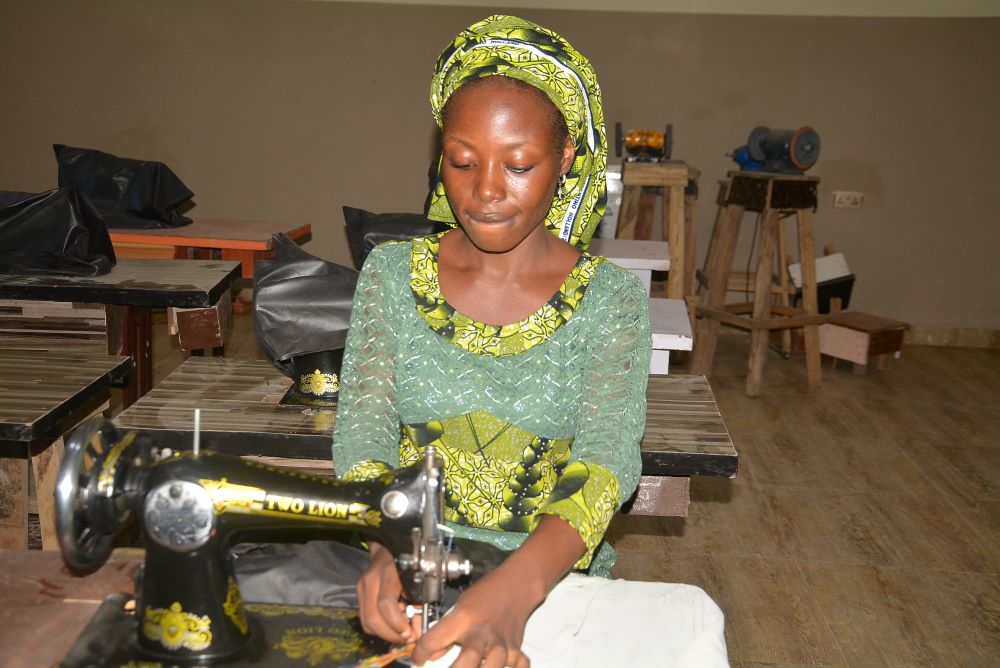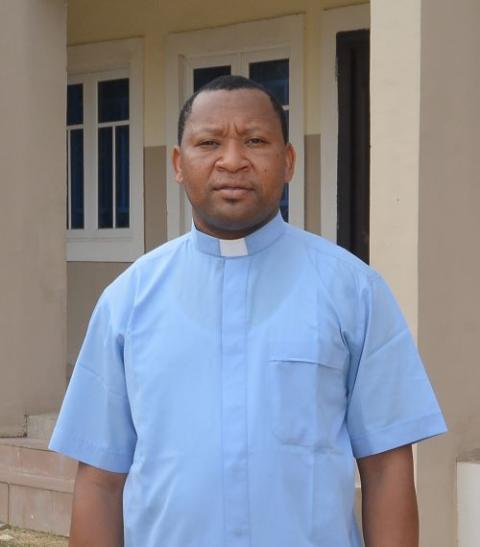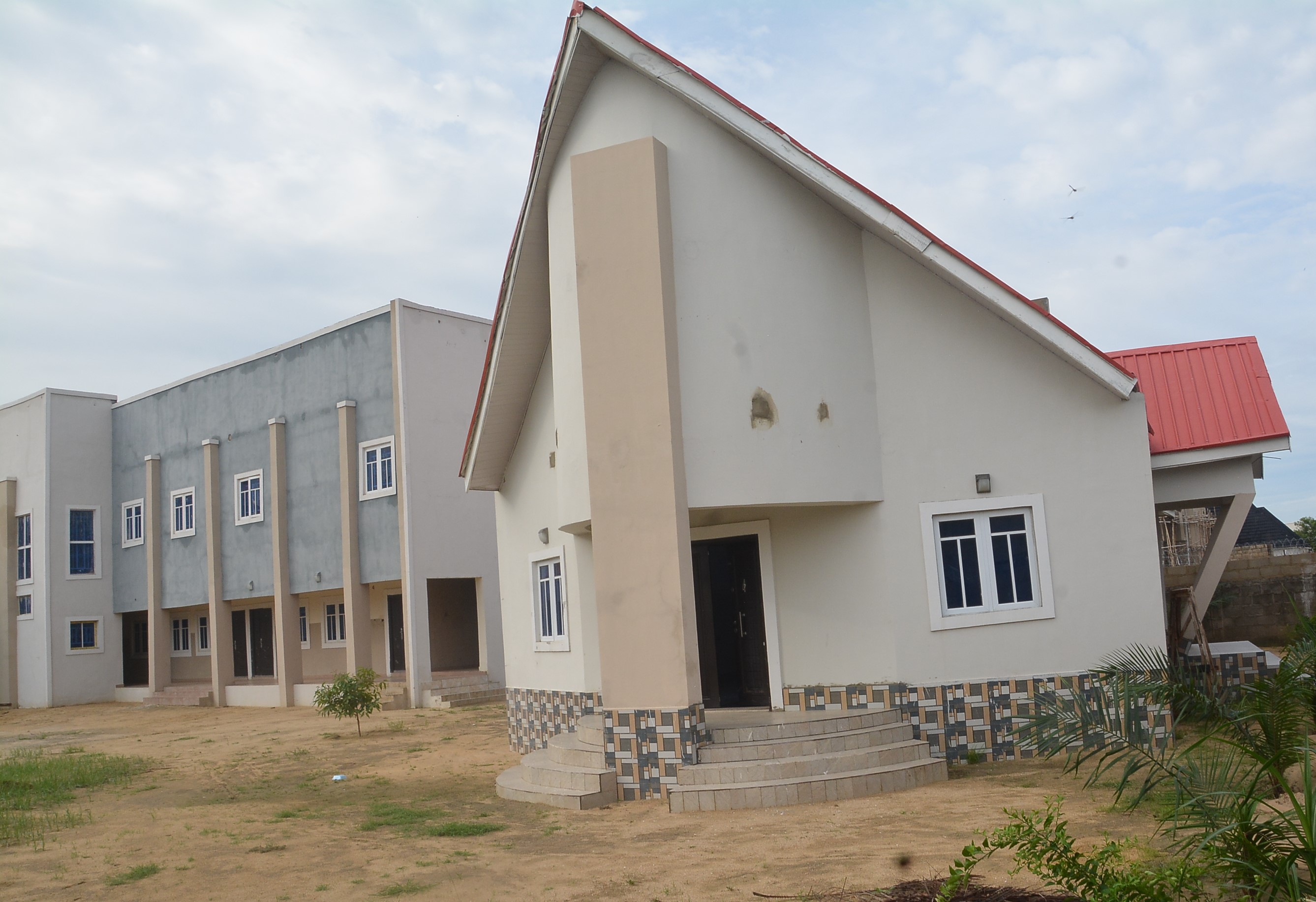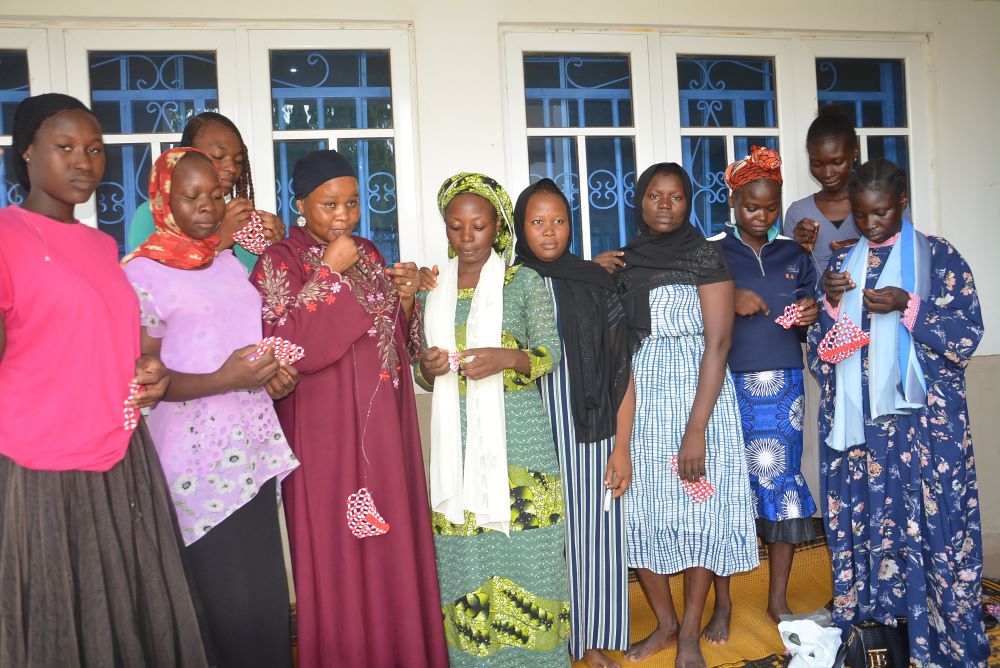
Janada Markus works on a clothing project at the skill acquisition department of the Salama Centre in Maiduguri, Nigeria. Markus is receiving treatment for psychiatric conditions after witnessing the jihadist group Boko Haram kill her father on the family's rice farm. (Valentine Benjamin)
As Nigeria seeks to recover and rebuild amid terror activities from the jihadist rebel group Boko Haram, a priest from the Maiduguri Diocese in the northeastern part of the country has emerged as a key figure caring for survivors.
Fr. Joseph Bature Fidelis is a clinical psychologist and director for Mental Health and Psychosocial Support at the Salama Centre in the Maiduguri Diocese. He has instituted programs to treat trauma and provide support for survivors of the Boko Haram insurgency, which has sought to destabilize Nigeria's democratic government in the northeastern region since 2009.
The center was launched by the Justice Development and Peace Commission, an arm of the Catholic Church in Maiduguri in partnership with Caritas Germany and Misereor, to strengthen community resilience and promote healing from the crisis.
The center offers shelter for people being treated for trauma. Programs include training in leather and clothing skills, and culinary skills. The group provides education to children forced out of school from the earliest ages to university level.

Fr. Joseph Bature Fidelis poses outside the Salama Centre, which he runs for the Catholic Diocese of Maiduguri in Nigeria. The center offers programs to treat trauma and provide support for survivors of the Boko Haram insurgency. (Valentine Benjamin)
Nearly 350,000 people have been killed from the conflict as of the end of 2020, which has also created severe impacts on the functioning of society in northeast Nigeria. Another decade of conflict could increase the death rate to over 1.1 million by 2030, according to a 2021 report from the United Nations Development Programme.
The United Nations Children's Fund, or UNICEF, reports that at least 5,129 children have been driven out of schools due to terror attacks.
The consequences of these attacks have left gaps in food security and broken the social system. It has also increased the level of vulnerability and poverty, leaving many people feeling utterly broken.
Early this year, the governor of Borno State, Babagana Zulum, said that an estimated 3.5 million people had lost their homes to the crisis in Borno, Adamawa and Yobe states. Babagana also estimated that more than 1 million people have been displaced and moved into Internally Displaced Persons camps.
Borno state, previously known as the "home of peace," has become a focal point for numerous deaths at the hands of Boko Haram, resulting in severe psychological issues for residents.
The situation has raised the level of distress of people who have had to deal with numerous mental health challenges, Fidelis said, including anxiety, depression, post-traumatic stress syndrome, continuous traumatic syndrome, psychotic manifestations, stigmatization and gender-based violence.
Janada Markus, he said, is just one example. She slipped into psychosis — a mental disorder characterized by a disconnection from reality — following the killing of her father by the jihadist group Boko Haram on their farmland in Maiduguri, the capital of Borno State.
According to Fidelis, the group marched into the Markus family rice farm, slitting the throat of Janada's father right in front of her. The attack left her with recurrent memories of the violence she had experienced — she was only 19 then, and it was her third experience with attacks from Boko Haram.

The Catholic-run Salama Centre of the Maiduguri Diocese treats survivors of Boko Haram violence in the northeastern part of Nigeria. In partnership with Caritas Germany and Misereor the center aims to strengthen community resilience and promote healing from the crisis. (Valentine Benjamin)
Fidelis explained that Janada struggled with intrusive memories of traumatic events and flashbacks that haunted her. "She had persistent anger and fears, which led to a higher level of hypervigilance and a loss of touch with reality, which was mistaken for demonic attacks," he said.
"She was brought to me for prayer on the account that she was possessed by demons. But after sitting with her, praying and listening to her, I found that she was dealing with a psychological (condition) which had made her out of touch with reality," Fidelis told NCR.
Markus was then enrolled in the center's intensive crisis management, counseling and psychotherapy programs. Fidelis said it took up to four months for her recovery. But she was then able to begin reintegration into society, reconnecting with family and friends, and continue her education. The Salam Center secured her admission at the Ramat Polytechnic, Maiduguri, where she studied tropical health and disease control. She then went on to the Borno State College of Health Technology, Maiduguri, where she is studying epidemiology and disease control.
In all, Markus' reintegration "has taken up to two years and will continue until she's done with her studies," Fidelis said. These are "all the necessary things you need to make available for her to reintegrate into society, to feel that sense of dignity of worth, to bounce back from that adversity" and become resilient, he told NCR.

Janada Markus is among women who have been trained in bead-making at the Salama Centre, at the trauma care center in the Maiduguri Diocese, Nigeria. The center treats survivors of Boko Haram violence in the northeastern part of the country, (Valentine Benjamin)
Fidelis' center faces challenges in how to care for so many like Janada Makus in a country with a long-standing shortage of mental health specialists. One in four of nearly 24 million Nigerians are experiencing some kind of mental illness, according to the World Health Organization.
Dr. Tunde Ojo, national coordinator of the National Mental Health Programme, said in 2023 that only 1 of 10 people in Nigeria who need mental health treatment are able to access services. But far from being a major public issue in Nigeria, mental health illnesses are shrouded in secrecy, making it difficult for people to seek treatment.
The Salama Centre works to bring the issue out of the shadows. It offers sensitization and awareness education to members of the public, initiating discussions with people who have seen or experienced violence. It educates people on topics that include stress, coping strategies, trauma, interpersonal relationships, parenting and gender-based violence.
The aim, Fidelis said, is to get people who are not suffering from stigmatization to understand how to treat people who live with trauma. The initiative also involves educating teachers on trauma sensitivity to identify a child that is traumatized and how to manage the pupil. They also learn how to support the children of internally displaced persons at school, emphasizing the importance of compassion.
Fidelis explained that this campaign aims to build social cohesion among communities. "We plan to broaden our outreach by using radio jingles to reach a wider audience across the northeast region, where the ongoing war has been affecting communities for years,” he said.
For those who turn to drugs and substance abuse to cope with their traumatic experiences, the center provides psychotherapy before referring them to Federal Neuro-Psychiatric Hospital in Maiduguri for detox programs. The center covers medical expenses for the entire detox process. It also offers counseling support for families and continues therapy for the individual afterward.
There are also special programs for children who are suffering from trauma, especially those who have witnessed the killings of their loved ones, as well as women and girls who are victims of gender-based violence.
Advertisement
he Catholic initiative has partnerships with organizations and health facilities that support their work. Fidelis explains that beneficiaries can also get referred for food assistance, along with water, sanitation and hygiene (WASH) assistance.
Since 2020, the initiative has provided intervention for over 3,000 people who have been deeply impacted by the attacks, and some 10,000 people who have benefited from its sensitization and psychosocial support programs.
However, the lack of funds and the inability to provide training and build the capacity of individuals to reach more communities, schools and hospitals — as the Boko Haram offensive continues — makes the work difficult.
The center's efforts are supported by church-based organizations. Caritas Germany provides support for mental health and psychosocial resilience building, while Misereor supports its peace building, psychosocial support and WASH programs.
The center is seeking partnerships and funding to cover airtime for its proposed radio programming in October. The program will include experts who can sensitize and educate listeners.
In the next seven years, the center wants to expand its services to dioceses across Nigeria. The goal is to broaden its mental and medical offerings beyond Borno by providing services delivered by trained psychologists, therapists, social workers, sociologists, anthropologists and community health workers.







